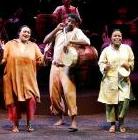SITE GUIDE
SEARCH
REVIEWS
FEATURES
NEWS
Etcetera and
Short Term Listings
LISTINGS
Broadway
Off-Broadway
NYC Restaurants
BOOKS and CDs
OTHER PLACES
Berkshires
London
California
DC
Philadelphia
Elsewhere
QUOTES
On TKTS
PLAYWRIGHTS' ALBUMS
LETTERS TO EDITOR
FILM
LINKS
MISCELLANEOUS
Free Updates
Masthead
Writing for Us
A CurtainUp  London Review
London Review
 London Review
London ReviewSpice Drum Beat: Ghoema
|
Ghoema: A drum made from a small wooden barrell or vat from which the lid and the bottom have been removed. An animal skin is stretched tightly over one end. It is small enough to be carried and played while walking. It’s possible that the word ghoema originates from ngoma which means drum in Swahili, a word which slaves from Zanzibar and Madagascar would have used.
|

Zenobia Kloppers, Loukmaan Adams and Carmen Maarman
(Photo: Baxter Theatre Cape Town) |
The show uses Kitchen Dutch or Afrikaans folk songs from the Cape Town area of South Africa which draw on the traditions of the community there who are descended from many strands of people who had their origins in the spice trade from Europe to what was the Dutch East Indies. The fascinating history of this melting pot of people, many of whom came as slaves in chains was the idea behind the musical and it is this narrative which links the songs.
Musically the show cannot be faulted in performance terms although it does have the feel more of a concert than a musical because the story line is travelogue gobbets rather than advancing a main plot. The talented singers and musicians work extremely hard but the songs are a problem for those who do not understand Afrikaans. Some are translated into English and the words projected onto the rear screen but the simplistic lyrics probably lose something in the translation as little of the double entendre is obvious to a more literal English audience.
Some of the songs like "Sugar Bush I want you so" are sexual. "The Handsome Cabin Boy" is about a woman who dressed as a man and went on board a ship like in the English sea shanty. There is reference to the Cape Town Carnival where these songs are sung each January. There was also the tale of the Virginians, Black American singers who during a nineteenth century visit were shocked at the level of discrimination and prejudice in Africa.
Even though I did not understand the words, I liked the actions of the cast synchronising their hands and knees while singing the "Hip Hip Hoorah" medley of songs. The performers have amazing energy and in one song, the men hold several old men puppets each of which appear to chunter and sing in a hilarious group number. We are told the difference between Moppies, comic songs and Picnic songs like Ghoemaliedjies, which consist of short refrains although both are based on the same rhythm.
It does seem churlish to criticise these hard working performers who excel musically. There was patently terrible tragedy and great privation of the early settlers in South Africa, many of whom were slaves ripped from their original communities but Spice Drum Beat is a too mellow account, understanding and sanguine like the affable performers themselves. As an offering on the international stage this feelgood aspect needs some work. Of course for most of South Africa’s history until recently, the stories and culture of these contributing people was suppressed by the racist, ruling class in government and education policy making. So in some sense Spice Drum Beat is a work in progress as this community find their theatrical and musical voice.
|
SPICE DRUM BEAT: GHOEMA
Written and directed by David Kramer Musical Director: Taliep Petersen With: Jody Abrahams, Loukmaan Adams, Munthir Dullisear, Zenobia Kloppers, Carmen Maarman Musicians: Danny Butler, Gammie Lakay, Howard Links, Solly Martin, Charlie Rhode Set Design: Julian Davids Costume Design: Illka Louw Lighting: Gert du Preez, David Kramer Sound: Akbar Khan and Graham Muir Choreography: Loukmaan Adams Puppets and props: Jesse Kramer Running time: Two hours ten minutes with one interval Box Office: 020 7328 1000 Booking to 27th January 2007 Reviewed by Lizzie Loveridge based on 11th December 2006 performance at the Tricycle Theatre, Kilburn High Road, London NW6 (Tube: Kilburn) |
|
London Theatre Tickets Lion King Tickets Billy Elliot Tickets Mary Poppins Tickets Mamma Mia Tickets We Will Rock You Tickets Theatre Tickets |




